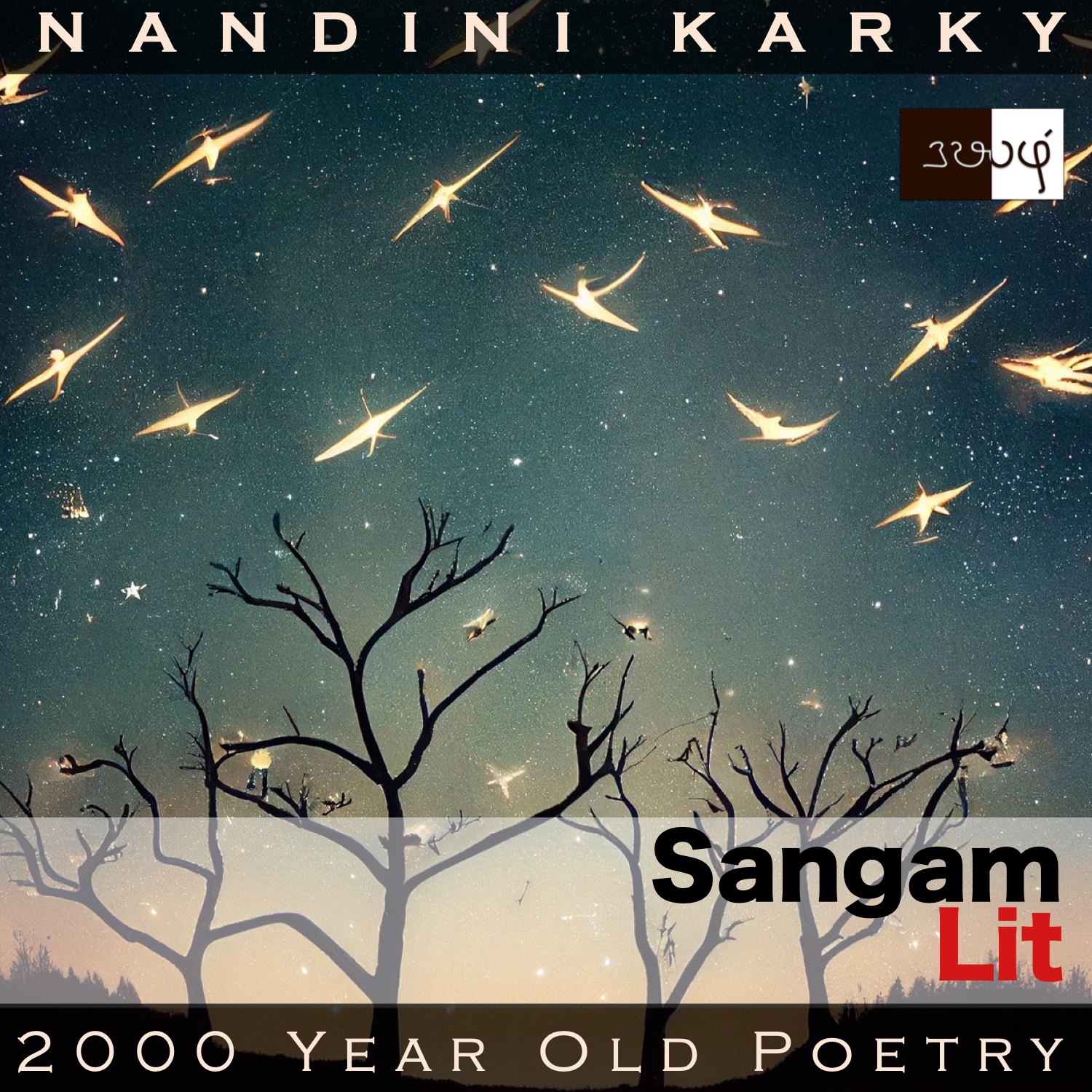Podcast: Play in new window | Download
Subscribe: Apple Podcasts | Spotify | Amazon Music | Android | iHeartRadio | Email | TuneIn | RSS | More

In this episode, we perceive the fury of a king in a battle, as depicted in Sangam Literary work, Puranaanooru 41, penned about the Chozha King Kulamutrathu Thunjiya Killivalavan by the poet Kovoor Kizhaar. Set in the category of ‘Vanji Thinai’ or ‘King’s prowess in the battlefield’, the verse elaborates on the state of people in enemy nations.
காலனும் காலம் பார்க்கும்; பாராது,
வேல் ஈண்டு தானை விழுமியோர் தொலைய,
வேண்டு இடத்து அடூஉம் வெல் போர் வேந்தே!
திசை இரு நான்கும் உற்கம் உற்கவும்,
பெரு மரத்து, இலை இல் நெடுங் கோடு வற்றல் பற்றவும்,
வெங் கதிர்க் கனலி துற்றவும், பிறவும்,
அஞ்சுவரத் தகுந புள்ளுக் குரல் இயம்பவும்,
எயிறு நிலத்து வீழவும், எண்ணெய் ஆடவும்,
களிறு மேல் கொள்ளவும், காழகம் நீப்பவும்,
வெள்ளி நோன் படை கட்டிலொடு கவிழவும்,
கனவின் அரியன காணா, நனவில்
செருச் செய் முன்ப! நின் வரு திறன் நோக்கி,
மையல் கொண்ட ஏமம் இல் இருக்கையர்,
புதல்வர் பூங் கண் முத்தி, மனையோட்கு
எவ்வம் கரக்கும் பைதல் மாக்களொடு
பெருங் கலக்குற்றன்றால் தானே காற்றோடு
எரி நிகழ்ந்தன்ன செலவின்
செரு மிகு வளவ! நின் சினைஇயோர் நாடே.
Yet another song in this long list of tributes to the Chozha king Killivalavan! The poet’s words can be translated as follows:
“Even the God of Death waits for the right time; But without minding that, you destroy many an army filled with spear-wielding soldiers, whenever and wherever you so wish, O king, victorious in war!
Shooting stars, raining down from directions eight; On a huge tree, a leaf-less long branch looking dry and barren; The fierce-rayed sun spreading a dense heat all around; Birds crying out with a shrill voice in a fear-evoking tone; Teeth falling on the ground; Hot oil dripping down from the head; Mounting upon a wild boar; Clothes being torn off by silver swords; Falling off from a cot – Such scenes that are difficult to accept even in dreams, you make it happen for real in the battlefield.
Hearing that you are heading there with such fierceness, the unprotected enemy soldiers become confused. They kiss the flower-like eyes of their sons and hide their sorrow from their wives. Such is the anxious state of the sad people in the countries that enrage you, O Valavan of many battles, the one who rides like the fire in the wind!”
Time to delve into the details mentioned in this celebration of this Chozha king’s warring nature! The poet starts by talking about the God of Death referred to as ‘Kootruvan’ or ‘Kaalan’ in Tamil philosophy. He says even this all-powerful God waits for the right time before taking the life of a person and contrasts this to the king, who has no such qualms, and attacks whenever and wherever he wants and ends the life of many a soldier with a spear. It’s amazing to think that at a point of time in this world such terrible words about a person’s attitude to end lives was considered praise!
Leaving aside our lenses of the present, if we turn to what the poet says, we are presented with a sequence of surreal scenes. Meteors falling from all eight directions, trees looking barren, the sun piercing the world with its furious heat, birds rushing about, crying in fear. From these outer scenes, the focus then turns inward and zooms on a person. This person’s teeth is falling down on the ground, oil is dripping from their head, they are seen mounting a wild boar, then, their clothes are being torn off by silver swords and they fall off from a cot! What do these scenes remind you of? ‘Nightmare’ is the word that would pop into most of our heads and that’s what this ancient poet is talking about too. He says such scenes that are difficult to comprehend and tolerate even in a dream, this king enacts out in the battlefield.
When such is the reality, what can you expect in the enemy nations, the poet questions. There, the anxious soldiers kiss the eyes of their children and hide their terror from their wives. Concluding that is the pitiable state of those nations that dare to enrage this king, who is the conqueror of many battles, and one, who arrives upon the battlefield with the fury of a fire in the wind!
Beyond the attitude of this king that appears atrocious in the eyes of the present, this verse from the past gives two interesting insights. One, into dream psychology and what people in the past experienced when their eyes closed in sleep during troubled times. Though two thousand or more years have passed, the nature of dreams seem the same. And, the other thing, the poem talks about is that domestic scene of men being called to take arms. In war, death always looms ahead, and the men understanding that, shower their affection on their beloved ones, and also, try to hide their sorrow from them. That’s the classic tussle of love and duty in the mind of every soldier, not only in the past but even in this modern world. And so, seeing these striking similarities, we can understand that we cannot brush away the history as ‘them’ and ‘us’ when looking at a different people at a different time. The only question is, how do we retain what’s best in them and let go of the rest, in our evolution to being a better species?




Share your thoughts...